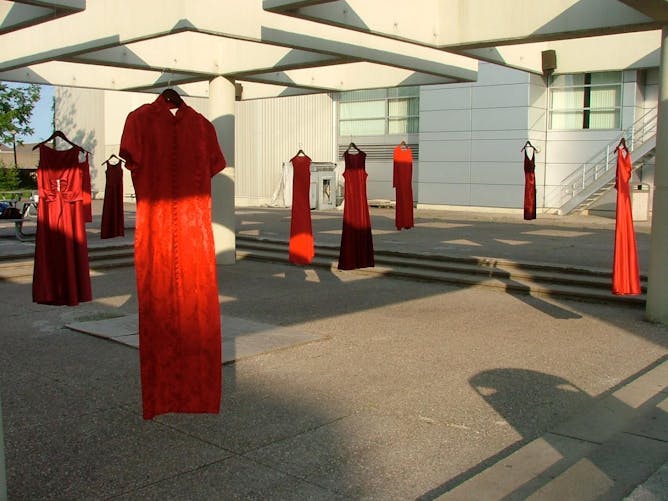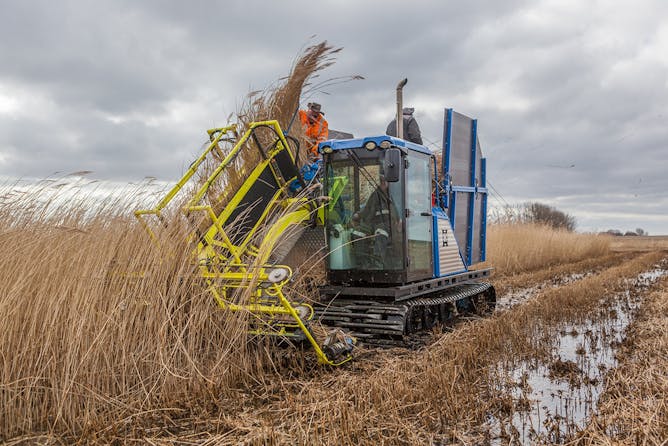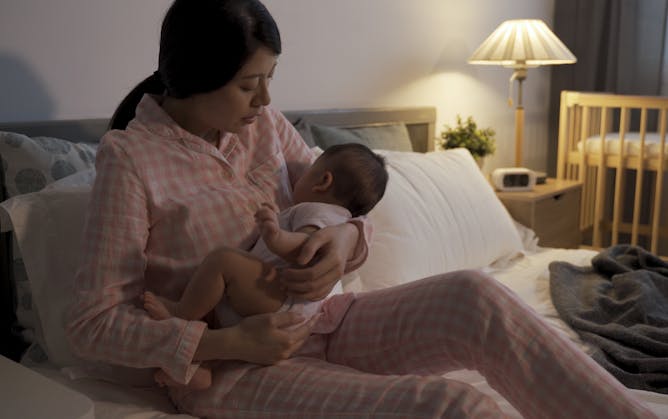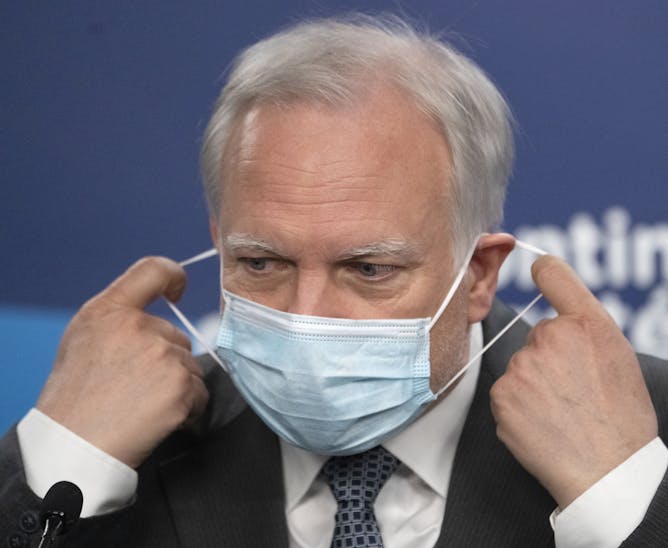|
Pay attention on your commute today, you may just see red dresses strewn in places you’d least expect them. That’s because May 5 marks Red Dress Day, a day to honour the lives of Missing and Murdered Indigenous Women and Girls.
Red Dress Day was inspired by the REDress Project, an art installation which involves the hanging of red dresses in public spaces. Created by Métis artist Jaime Black, the installation has since been replicated in communities across Canada.
Today in The Conversation Canada, Nicolette Little, from the University of Calgary, talks about the REDress Project along with the Memory Stone Project, gender-based violence and how collaborative and replicable activism can help causes gain momentum.
She says initiatives like the REDress Project and the Memory Stone Project that are easy to participate in and reproduce, and that make people feel like they are part of a community that cares, are important and can truly help inspire every day acts of change.
Also today:
Nyà:wen (thanks),
|

|
Haley Lewis
Culture + Society Editor
|
|

The REDress Project sees red dresses suspended where you would least expect them. The project was created by Jaime Black.
(The REDress Project/Facebook)
Nicolette Little, University of Calgary
Projects that are easy to participate in, reproduce and that make people feel like they are part of a community that cares are important.
|

People are silhouetted as they sit in a bar having a drink during the COVID-19 pandemic in Toronto on March 30, 2022, as cases continued to climb in Ontario and around Canada after most provinces lifted various restrictions and mask mandates.
THE CANADIAN PRESS/Nathan Denette
Jason Hannan, University of Winnipeg
As COVID-19 continues to evolve, surprise, disappoint and frustrate us, efforts by politicians to pretend it’s behind us is a dangerous form of gaslighting that will deepen societal divisions.
|

Paludiculture in action. Chain-drive equipped tractors are a prerequisite for agricultural activities on rewetted peat soils.
(Tobias Dahms)
Rafael Ziegler, HEC Montréal; Magali Simard, HEC Montréal; Rahma Eldeeb, Université de Montréal
Drained peatlands contribute five per cent of global carbon emissions. Paludiculture, or agriculture on wet peatlands, protects peatlands and allows farmers to maintain their livelihoods.
|

There are many ways that families, health-care providers and communities can support the sleep of mothers of babies six months and older.
(Shutterstock)
Christine Ou, University of Victoria; Wendy Hall, University of British Columbia
Supporting mothers’ and infants’ sleep can decrease the stressors of motherhood, improve maternal mood and mental health and promote better infant development.
|

Internet technologies have meant that the public sphere has now become digital, but what does that mean for its ownership?
(Gian Cescon/Unsplash)
Eleonore Fournier-Tombs, United Nations University
Elon Musk’s purchase of Twitter is seen as a threat to the digital public square. International regulation is required to protect internet users’ access to democratic public spaces.
|
La Conversation Canada
|

Le directeur par intérim de la santé du Québec, le Dr Luc Boileau, enlève son masque alors qu'il arrive pour faire le point sur la Covid-19, le 21 avril 2022 à Montréal. Le ministère de la Santé du Québec recommande la prolongation du mandat du masque jusqu'à la mi-mai.
LA PRESSE CANADIENNE/Ryan Remiorz
Antoine Lemor, Université de Montréal
Québec maintient l’obligation du port du masque jusqu’au 14 mai 2022. Cette exception ne semble pas moins due à une « prudence » épidémiologique qu’à des contraintes politiques et institutionnelles.
|
Ukraine Invasion
|
-
Swaran Singh, Jawaharlal Nehru University
By remaining neutral over Ukraine, India is navigating a delicate balancing act between Russia and the west.
-
Daniel Salisbury, King's College London
Captured military equipment in Ukraine has revealed the extent to which western tech is used in Russian weapons systems.
|
|
Health
|
-
Karen Willis, Victoria University; Jaimie-Lee Maple, Victoria University; Marie Bismark, The University of Melbourne; Natasha Smallwood, Monash University
Burnout among health-care workers has implications for the whole workforce, and patients too.
|
|
Politics
|
-
Morgan Marietta, UMass Lowell
If the Supreme Court guts landmark rulings that established a constitutional right to abortion, the legal struggle will shift to statehouses and state courtrooms.
|
|
Science + Tech
|
-
Duxin Sun, University of Michigan
The COVID-19 mRNA vaccines put nanomedicine in the spotlight as a potential way to treat diseases like cancer and HIV. While the field isn’t there yet, better design could help fulfill its promise.
|
|
|
|
| |
| |
| |
| |
|
|